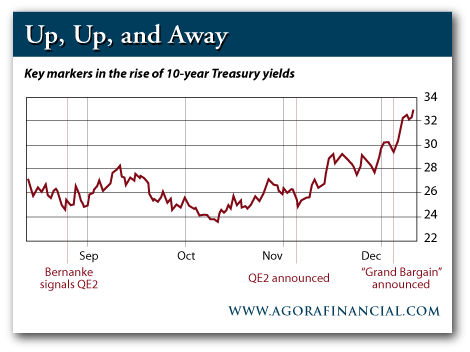Gold shot up $13 an ounce, to $1,397, as soon as the Comex opened at 8:20 Monday morning. The yield on a 10-year Treasury note is up to 3.37%. Yet there’s no news, no fresh data point to make traders itchy. Just an unfriendly environment if you’re making government policy or a great one if you’re willing to bet against it succeeding.
The 10-year yield is now at a six-month high. It has risen 100 basis points, a full percentage point, since early October. Through last week, this was largely a function of the Bernanke backfire, bond traders frightened by the Federal Reserve’s renewed pursuit of easy money policies.

A good chunk of this increase has come in the last week. Bond traders have something new to be frightened by: the grand bargain that President Obama and the Republicans in Congress reached last week.
Sure, it extends current tax rates at all levels of income, but it also includes a host of goodies like an extension of unemployment benefits and a cut in the payroll tax of two percentage points, and there are no spending cuts to accompany them.
Special Offer: Get yields of 8% to 15% in fixed-income securities, including bank convertibles, Canadian trusts and preferreds. Click here for instant access to model portfolios and recommended buys in Forbes/Lehmann Income Securities Investor.
“The deal demonstrates a total lack of will to cut the fiscal deficit even a smidge,” says Strategic Short Report editor Dan Amoss. “Holders of U.S. dollars and Treasury bonds will react; they’ll soon realize that the U.S. government’s long-run budget projections are even further off the mark than they typically are.”
In that vein, we note Uncle Sam ran a $150.4 billion deficit during November, according to the Treasury Department, the 26th consecutive monthly shortfall. And the largest ever in a month that starts with an “N.” Revenue was higher than a year ago, but spending was higher still.
Of course, that’s just the “official” number. According to Treasury’s own website, the national debt grew during November by $191.9 billion. Good grief.
“In the last month, the interest rate on that key benchmark – the 10-year Treasury note – is up 28%,” Chris Mayer, editor of Mayer’s Special Situations, agrees while looking at the prism from yet another angle. “So the U.S. government’s funding costs have just gone up 28% in the last month. Those big deficits need financing and finally the market is wondering just how good of a credit old Uncle Sam really is.”
Economist John Williams, who looks over the government’s books and ferrets out the truth in the footnotes, reports that the annual deficit is now running at a pace of $4-5 trillion. This includes the change in unfunded liabilities, such as Social Security obligations.
As the bond vigilantes awaken from their slumber, we’re reminded again of Bill Clinton’s infamous line, spit out in fury during a White House meeting early in his first term, told in Bob Woodward’s book The Agenda:
“You mean to tell me the success of [my economic] program and my reelection hinges on the Federal Reserve and a bunch of f*****g bond traders?”
No doubt, a similar “discussion” is under way today. Except the number of zeros has grown substantially, as has the desire for the federal government to save everyone from everything.
On the Importance of Bond Traders by Addison Wiggin originally appeared in the Daily Reckoning.
This entry passed through the Full-Text RSS service — if this is your content and you're reading it on someone else's site, please read our FAQ page at fivefilters.org/content-only/faq.php
Five Filters featured site: So, Why is Wikileaks a Good Thing Again?.

No comments:
Post a Comment